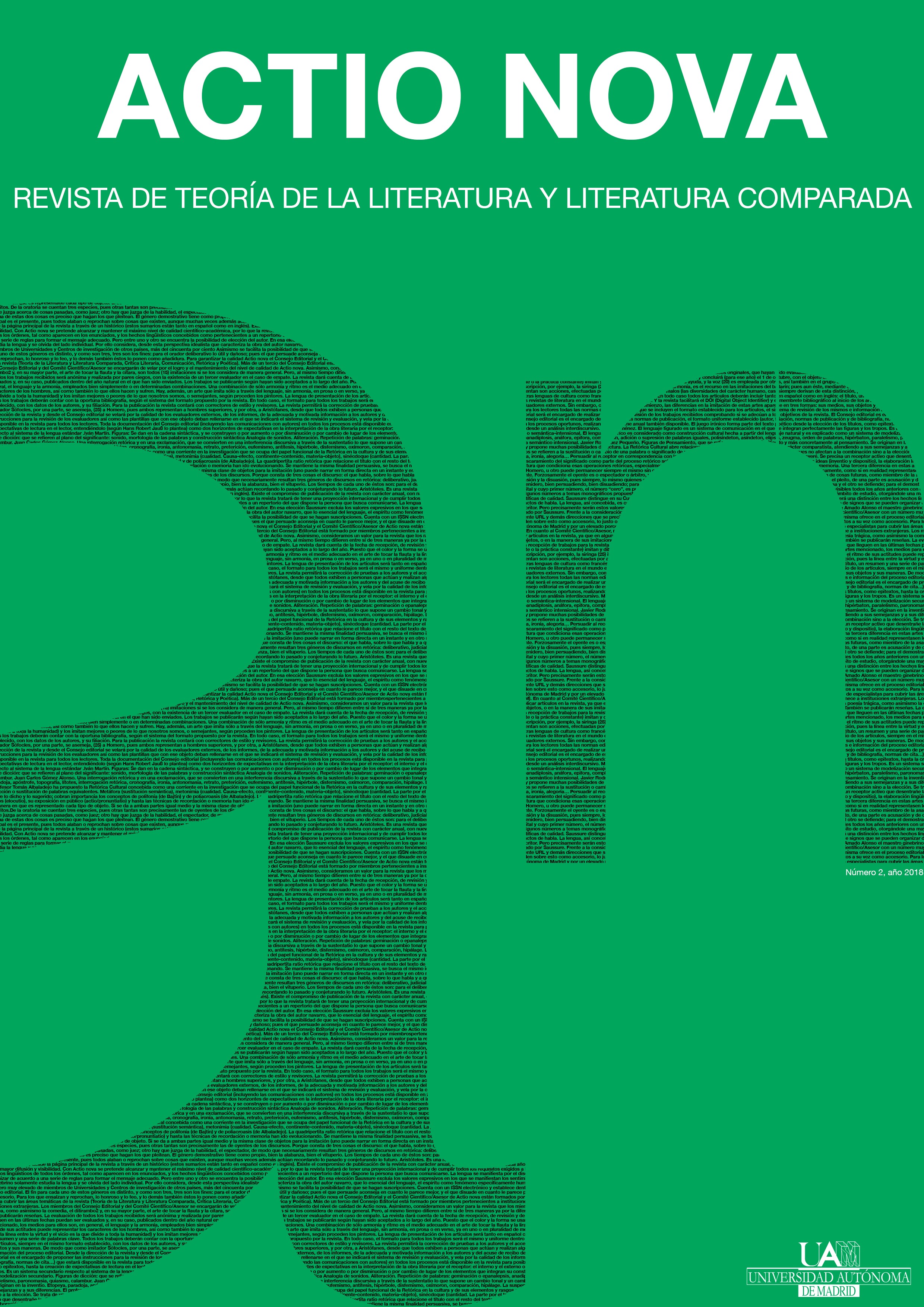From exile to aesthetization of displacement: a comparative analysis of "Americanah" and "Ghana must go"
Keywords:
aesthetization of displacement, exile, identity, Chimamanda Ngozie Adichie, Taiye SelasiCopyright (c) 2018 ACTIO NOVA: Revista de Teoría de la Literatura y Literatura Comparada

This work is licensed under a Creative Commons Attribution-NonCommercial 3.0 Unported License.
Abstract
Writers living and writing about rootlessness have been developing a distinctive trend within the traditional literature of exile, in which the nostalgic perspective of being unable to return home is replaced by one that calls «home» anywhere in the world. Two novels that address this issue in detail are Americanah, by Chimamanda Ngozie Adichie, and Ghana Must Go, by Taiye Selasi. This article sets out to analyse to what extent the perception of this new backdrop of homelessness differs from traditional exile, as well as how a new aesthetization of displacement or rootlessness poses questions to the narrative and to the identity of the characters in the novels. The theory developed by several authors in the realm of cultural studies has guided the comparison with a view to achieving the proposed objective.
Downloads
References
Appiah, K. A. (2007). Cosmopolitismo. La ética en un mundo de extraños. Buenos Aires: Katz Editores. Achebe, C. (2010). The African Trilogy: Things Fall Apart; No Longer at Ease; Arrow of God.London: Everyman’s Library -Alfred A. Knopf.Adichie, C. N. (2013). Americanah. London: Fourth Estate.Arabian, S.y Rahiminezhad, V. (2015). «Journey and Return:Visiting Unbelonging and Otherness in Adichie’s Americanah», enJournal UMP Social Sciences and Technology Management, 3 (3-Supp. 1), 536-541.Benjamin, W. (1996). Obras escolhidas. Vol. 1: Magia e técnica, arte e política: ensaios sobre literatura e história da cultura(8ªed. revista). São Paulo: Ed. Brasiliense.Bhabha, H. (1994). The Location of Culture. London: Routledge.Braga, C., y Gonçalves, G. R. (2014). «Fictional Representations of Contemporary Diasporas: The case of the Invisible Diasporic Women of Chimamanda Ngozi Adichie», enInter-Disciplinary.Net: http://www.inter-disciplinary.net/at-the-interface/wp-content/uploads/2014/05/Braga-and-Gonçalves-dias7-dpaper.pdf (último acceso en 15/02/2017).Bures, F. (2006). «Things Come Together: A Journeythrough Literary Lagos», enVirginia Review Quarterly, 16 (Primavera 1940): http://www.vqronline.org/web-dispatch/things-come-together-journey-through-literary-lagos (último acceso en 11/04/2018)Fanon, F. (2001). Los condenados de la tierra. México: Fondo de Cultura Económica.Gilroy, P. (2001). «Prefácio à edição brasileira», enO Atlântico negro: modernidade e dupla consciência. São Paulo: UCAM: Editora 34.
Hall, S. (1990). «Cultural Identity and Diaspora», enIdentity: Community, Culture, Difference.(pp. 222-237). London: Lawrence & Wishart.Khedekar, A. D. (2014). «The politics of hair in Chimamanda Ngozi Adichie ?s Americanah», en Global Journal of Multidisciplinary Studies, 3(12), 38-40 : http://gjms.co.in/index.php/GJMS/article/view/481 (últimoacceso en 03/04/2018)Lipovetsky, G.y Serroy, J. (2016). La estetización del mundo: vivir en la época del capitalismo artístico. Barcelona: Anagrama.Lukács, G. (2016). Teoría de la novela. Barcelona: Penguin Random House.Minh-Ha, T. T. (2011). Elsewhere, Within Here. Immigration, refugeeism and the boudary event.San Francisco: Routledge.Rose, J. (2011). The Jacqueline Rose Reader. London/Durham: Duke University Press.Saer, J. J. (2000). El entenado(4ªedición). Buenos Aires: Seix Barral.Said, E. (2005). Reflexiones sobre el exilio. Madrid: Random House Mondadori.Said, E. (2014). Freud and the Non-European. London: Verso.Selasi, T. (2005). «Bye-Bye Babar», en The Lip: http://thelip.robertsharp.co.uk/?p=76 (último acceso en 10/04/2018)Selasi, T. (2013a). Ghana Must Go. London: Penguin Books.Selasi, T. (2013b). «Taiye Selasi on discovering her pride in her African roots», enThe Guardian:https://www.theguardian.com/books/2013/mar/22/taiye-selasi-afropolitan-memoir (último acceso en 11/04/2017)Solanes, J. (2016). En tierra ajena. Exilio y literatura desde la «Odisea» hasta «Molloy».Barcelona: Acantilado.Spivak, G. C. (2000). «Diasporas old and new: women in the transnational world», en Trifonar, Peter Pericles (Ed.), Revolutionary pedagogies: cultural politics, instituting
Tveit, M. (2013). «The Afropolitan must go»,en Africa is a Country: http://africasacountry.com/2013/11/the-afropolitan-must-go (último acceso en 10/04/2017).Ucham, E. U. (2015). «An exploration of afropolitanism in Taiye Selasi’s Ghana must go and Chimamanda Adichie’s Americanah»(tesis), en http://repository.unam.edu.na/handle/11070/1452(último acceso en 11/04/2018)Weil, S. (2002). The Need for Roots. Oxon: Routledge.Wood, J. (2014). «On not going home», enLondon Review of Books, 36 no 4, 3-8.

